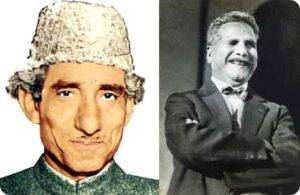My songs’ notes are higher than the courage of my friends: Farsi verses by Allama Iqbal
My songs’ notes are higher than the courage of my friends: Farsi verses by Allama Iqbal with tashreeh by Sufi Ghulam Mustafa Tabassum [Urdu and English]
نواز ز حوصلہ دوستاں بلند تر است
غزل سرا شدم آنجا کہ ہیچکس نشنید
(یہ شعر پیام مشرق کی ایک غزل سے لیا گیا ہے)
اس شعر کا اردو ترجمہ یہ ہے
’’ میرے نغموں کے سر میرے دوستوں کے حوصلے سے زیادہ اونچے ہیں، میں نے ایک ایسی جگہ غزل سرائی کی کہ جہاں اسے کسی نے نہیں سنا۔‘‘

Ghulam Mustafa Tabassum and Allama Iqbal
یہ بات عام تجربے کی ہے کہ دنیا میں ایک غیر معمولی ذہانت رکھنے والا انسان جسے نابغہ کہتے ہیں اپنے وقت سے بہت پہلے پیدا ہو جاتا ہے اور اس کے عہد کے لوگوں کی ذہنی سطح اس کی ذہنی سطح سے بہت نیچی ہوتی ہے نتیجہ یہ ہوتا ہے کہ اس کے ہم عصر لوگ اس کی بات کو نہیں سمجھ سکتے اور اس سے کماحقہ فائدہ نہیں اٹھا سکتے اس کی آواز صدا بہ صحرا ہو کر رہ جاتی ہے۔
اگر یہ معاملہ بات نہ سمجھنے تک ہی محدود رہے تو اس میں کوئی مضائقہ نہیں ہوتا لیکن اس بیگانگی کا نتیجہ یہ ہوتا ہے کہ بات کرنے والا نہ صرف خود کو اس فضا میں اجنبی محسوس کرتا ہے بلکہ اس کے گرد و پیش کے رہنے والے لوگ اس سے اتنے مرعوب ہو جاتے ہیں کہ ان میں غیر شعوری طور پر نفرت کا جذبہ جنم لے لیتا ہے اور وہ احساس کمتری کا شکار ہو جاتے ہیں اور وہ اپنے اس احساس کو چھپانے کے لئے ایسی حرکتیں کرتے ہیں جو اس بلند شخصیت انسان کے لئے ضرر رساں ہوتی ہیں۔ انسانی طبیعت کا یہ خاصا ہے کہ وہ عموماً رسمی اور روایتی چیزوں کو پسند کرتی ہے سہولت کے علاوہ روایت پسندی ایک ایسا شعار بن جاتا ہے جس کی پابندی کرنا وضعداری شرافت اور عظمت کی نشانی خیال کیا جاتا ہے اور جب کوئی غیر معمولی ذہانت رکھنے والا انسان زندگی کے مسائل پر نئے انداز میں سوچتا ہے اور اس کے خیالات اور اس کے طرز عمل میں کوئی جدت ہوتی ہے تو لوگ اسے ناپسند کرتے ہیں اور یہ ناپسندیدگی اکثر شدت اختیار کر لیتی ہے۔
تاریخ اس بات کی شاہد ہے کہ دنیا والے نئے انداز میں سوچنے والوں سے کیا کیا بدسلوکیاں کرتے رہے ہیں۔ وحی الٰہی کے لانے والے انبیا کو انسانوں نے کیا کیا اذیتیں پہنچائی ہیں۔ اولیاء کرام ان کی زد سے نہیں بچے۔ بڑے بڑے فلسفی، فنکار اور دانشور دنیا والوں کی کم فہمی کے باعث ان کی بے رخی اور بے اعتنائی کا شکار ہو کر رہ گئے۔ ایک زمانہ گزر جانے کے بعد جب دنیا کی ذہنی سطح بلند ہوئی تو لوگوں کو ہوش آیا اور انہیں اپنے کئے پر ندامت ہوئی اور انہوں نے گم شدہ جواہر ریزوں کو تلاش کر کے گلے سے لگایا۔
ابھی کوئی پچاس برس پہلے اسی سر زمین میں مرزا غالب کو مہمل گو کہا جاتا تھا۔ اقبال نے جب اپنی شاعری میں فکر اور اسلوب کا رنگ بدلا تو لوگوں نے اسے وہی طعنہ دیا جو مرزا مرحوم کو دیا تھا۔ اقبال کے اس شعر پر کہ
نالہ ہے بلبل شوریدہ ترا خام ابھی
اپنے سینے میں اسے اور ذرا تھام ابھی
پھبتیاں کسی گئیں۔ لوگوں نے طنزاً کہا کہ سیب خام تو سنتے آئے تھے۔ یہ سمجھ میں نہیں آیا کہ ’’نالہ خام‘‘ کیا بلا ہے انہیں کیا خبر تھی کہ بلبل شوریدہ کا استعارہ اقبال خود اپنے لئے استعمال کر رہا ہے۔ وہ محسوس کر رہا ہے کہ اس کے نغمے ابھی خام ہیں پختہ نہیں ہوئے۔ ابھی ان نغموں کو سینے میں روک کر رکھنے کی ضرورت ہے۔ ابھی فضا سازگار بھی نہیں کہ ان کا اظہار کیا جائے۔
اقبال کے نغمے پختہ بھی ہو گئے ہیں لیکن سننے والوں کی کم فہمی اور بے رخی کا وہی عالم رہا۔ اور اسے یہ کہنا پڑا:
’’من صداے شاعری فردا ستم‘‘
میں آنے والے کل کے شاعر کی آواز ہوں۔ میرے اشعار آج کے لوگ نہیں، آئندہ نسل سمجھ سکے گی۔ اب ذرا آج کے شعر کو سنئے!
نوا ز حوصلہ دوستاں بلند تر است
غزل سرا شدم آنجا کہ ہیچ کس نشنید
اس کے نغموں کی آواز، اس کے سننے والوں کے کانوں کے لئے نا مانوس تھی اس لئے کوئی انہیں سن نہ سکا۔
اس شعر میں اقبال نے ایسے نا آشنا لوگوں کے لئے دوستوں کا لفظ استعمال کیا ہے جو بہت پیارا ہے وہ ان کی کم فہمی کے لئے حوصلہ کا لفظ لایا ہے۔ ’’ حوصلہ دوستاں‘‘ کے لفظوں سے صاف عیاں ہے کہ ان لوگوں میں شاعر کی باتیں سننے کا حوصلہ یا تاب نہیں۔ نظیری نیشاپوری نے کیا خوب کہا ہے:
نوا فزود ز اندیشہ بریشم عود
غزل بہ زمزمہ خوانم کہ پردہ ہا پست اند
عود ساز کا نام ہے زمزمہ دھیمے سروں میں گائے ہوئے راگ کو کہتے ہیں۔ پردہ سر ہے نظیری کہتا ہے:
’’ کہ میرے نغموں کی آواز ساز کے سروں سے اونچی ہے اس لئے مجھے دھیمے سروں میں راگ گانا پڑا کیونکہ سازوں کے سر نیچے سر ہیں۔‘‘
نظیری اور اقبال دونوں زمانے کے ستم رسیدہ تھے لیکن نظیری زمانے کی ناقدری سے تنگ آ کر اپنے آپ کو ان کی سطح پر لانے کی کوشش کر رہا ہے۔
My song surpasses the courage of my friends
I sang a ghazal where no one heard it.
(This couplet is taken from a ghazal in “Payam-e-Mashriq”)
The Urdu translation of this couplet is:
“My songs’ notes are higher than the courage of my friends, I sang a ghazal in a place where no one heard it.”
It is a common experience that a person of extraordinary intelligence, known as a genius, is often born before their time. The intellectual level of the people of their era is much lower than theirs. As a result, contemporary people cannot understand them and cannot benefit from them. Their voice becomes a cry in the wilderness.
If this misunderstanding were limited to not understanding the point, there would be no problem. However, this estrangement leads to the person feeling alien in that environment, and the people around them become so intimidated that an unconscious feeling of hatred arises within them. They develop an inferiority complex and engage in actions that harm the exceptional person. Human nature generally favors conventional and traditional things. Apart from convenience, traditionalism becomes a norm that is considered a sign of decency, respect, and greatness. When an extraordinarily intelligent person thinks about life’s issues in new ways and their thoughts and actions exhibit novelty, people dislike them. This dislike often intensifies.
History bears witness to the fact that the world has mistreated those who think in new ways. Prophets who brought divine revelations have been subjected to great suffering by humans. Saints have not escaped their reach. Great philosophers, artists, and thinkers have faced neglect and indifference due to the world’s lack of understanding. After a period, when the world’s intellectual level rose, people realized their mistakes and sought out these lost gems and embraced them.
Just fifty years ago, Mirza Ghalib was considered nonsensical in this very land. When Iqbal introduced new ideas and styles in his poetry, he received the same taunt as Mirza. Regarding Iqbal’s verse:
“The lament of the restless nightingale is still raw
Hold it a little longer in your chest”
People mocked, saying they had heard of unripe apples but could not understand what “raw lament” meant. Little did they know that Iqbal was using the metaphor of the restless nightingale for himself. He felt his songs were still raw and needed to be withheld. The time was not yet ripe for their expression.
Iqbal’s songs have matured, but the listeners’ lack of understanding and indifference remained the same. He had to say:
“I am the voice of the poet of tomorrow”
My verses will be understood by future generations, not the people of today. Now, listen to today’s verse:
“My song surpasses the courage of my friends
I sang a ghazal where no one heard it”
The notes of his songs were unfamiliar to the ears of his listeners, so no one could hear them.
In this verse, Iqbal uses the word “friends” affectionately for such unfamiliar people. He uses the word “courage” for their lack of understanding. The phrase “the courage of friends” clearly indicates that these people do not have the courage or capacity to listen to the poet’s words. As Nizami Nishapuri beautifully said:
“My song surpasses the strings of the instrument
I sang in a low tone because the strings were low”
The instrument here refers to the musical instrument, and “low tone” means singing in soft notes. Nizami says:
“My song’s notes were higher than the instrument’s, so I had to sing in a low tone because the strings were low.”
Both Nizami and Iqbal were victims of the times, but Nizami, frustrated by the world’s lack of appreciation, tried to bring himself down to their level.



